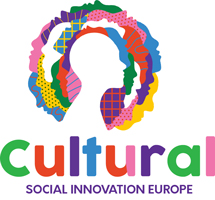About CSI EU
Context

Among the most vulnerable to the pandemic are adults and young people with lower skills. An estimated 9 million UK adults still struggle to use the internet and their device independently, thus adapting to working and socialising online has left thousands struggling, while exacerbating the digital divide. Likewise, young people with lower skills are also at risk as the Institute of Student Employers have stated that “many employers report they will be recruiting less entry-level hires as a result of COVID-19”. Thereby, 80% of young people in the UK stated the pandemic has worsened their mental health. Therefore, COVID has accelerated the need for providing young adults with the transversal skills and learning paths to keep them motivated, relevant and employable in times of social upheaval and economic crisis.
Moreover, culture has never felt more urgent and socially valuable than during the pandemic confinement phase, with cultural, creative and arts organisations reaching out to new (and old) audiences via digital channels, and the sentiment of solidarity finding expression in concrete actions to help people affected by the pandemic. In many ways these Cultural innovators from the creative & arts organisations displayed what could be achieved. CSI EU seeks to learn from and build on that experience by engaging young adults to come together to develop social innovation projects in the cultural, arts and creative space for the development of their personal and professional life, the good of their local communities and to help build solidarity, resilience and improved mental health in the face of unprecedented times.
Solution
While COVID-19 continues to spread fear, anxiety and economic downturn across the world, it also heralds a new era of innovations, with humanity as the epicentre. Culture-based social innovation offers a silver lining for the strengthening of local economies and wellbeing.
Objective
Therefore, CSI EU will empower adults and young people most affected by COVID to become confident cultural social innovators and design innovative (digital) solutions to challenges posed by the crisis. To do so, we will modernise youth and adult education curricula and practice. Specific objectives are:
Project Activities
The first tangible results of the project will be the intellectual outputs:

